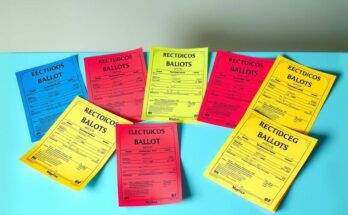The article posits that the fixation on elections is detrimental to true democracy. It highlights the negative outcomes of the 2024 elections, including the rise of autocracies, violence, and political manipulation. The author advocates for empowering citizens through alternative democratic processes rather than solely relying on elections to foster meaningful governance.
As we enter the New Year, many individuals make resolutions, often centering on personal choices such as abstaining from alcohol or unhealthy foods. However, in light of recent events, I propose a resolution of a different kind: the abandonment of our investment in elections. While democracy and elections are frequently mistaken as synonymous, they represent fundamentally different concepts. The experiences of 2024, often described as the most significant election year in history, serve as a valuable lesson in this distinction.
In 2024, more than four billion people participated in elections across over 70 nations, with widespread hopes for an enhancement of democracy. Unfortunately, these anticipations were met with disillusionment. Instead of fostering democratic governance, elections exacerbated the entrenchment of autocracies, incited violence, and destabilized governments, ultimately harming democratic ideals. Josh Lerner, co-executive director of People Powered, poignantly remarked, “Our obsession with elections is killing democracy.”
It is important to recognize that in numerous countries, elections have been weaponized against the populace. Freedom House documented 22 instances where incumbents sought to imprison or discredit their rivals, and 16 occasions where voters encountered limited or manipulated choices at the ballot. Furthermore, violence permeated these elections: the assassination of political candidates occurred in Mexico and South Africa, ethnic conflicts erupted in India, and attempts on prominent figures’ lives were reported in multiple contexts.
The concept of a “sore winner” emerged prominently in 2024, as ruling parties manipulated electoral outcomes to further suppress opposition. In Georgia, for instance, the ruling party attempted to render the opposition illegal following their parliamentary victory. Even in the United States, the former president continued to threaten adversaries with incarceration despite his electoral success, demonstrating a disturbing trend toward authoritarianism.
Despite these concerning developments, some have attempted to identify positive outcomes; there were significant changes in leadership in countries such as India, South Africa, and Japan. However, even these transitions often birthed unrest and political infighting, as evidenced by the political turmoil in South Korea following a contested election.
The events of 2024 have guided us to a crucial realization: elections may indeed undermine democratic principles. Leonora Camner, the executive director of Democracy Without Elections, stated, “Elections are fundamentally disempowering. They are about dividing people with slogans and stoking fears.” The solution, as suggested by Camner, lies in pivoting focus from elections towards empowering citizens to govern themselves through constructive democratic processes. Nonetheless, entrenched interests currently dictate the electoral landscape, obstructing any meaningful reform.
In the aftermath of this tumultuous year, one must ask: what alternatives exist to elections? Matt Leighninger, from the National Civic League, outlined ten initiatives aimed at enhancing civic engagement, including citizens’ assemblies, participatory budgeting, and improved civil discourse in public meetings. These innovative methodologies could catalyze a more participatory form of governance, as opposed to the current, limited conception of democracy where electoral participation is the primary emphasis.
The article reflects on the disillusionment surrounding elections worldwide, particularly highlighted during the tumultuous year of 2024. More than half of the global population participated in numerous electoral exercises, which were initially anticipated to promote democracy. However, the outcomes revealed a stark contrast, with many nations experiencing the consolidation of autocratic regimes, electoral manipulation, and widespread violence. The author encourages reframing the concept of democracy beyond mere elections, advocating for democratic processes that genuinely empower individuals.
In conclusion, the tumultuous events of 2024 present a compelling argument for reevaluating the societal preoccupation with elections as a method of democratic engagement. The misuse of electoral processes, which ultimately lead to increased autocracy and violence, prompts a necessary discourse on alternative systems of governance that prioritize citizen empowerment. Moving forward, it is vital to foster innovative democratic practices that enhance participation and ensure that all voices are heard, as opposed to merely counting votes.
Original Source: www.vcstar.com




